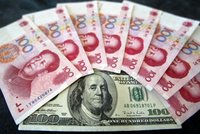 Indeed, it's as unlikely as it sounds.
Indeed, it's as unlikely as it sounds.
But the US government today said that China is not technically manipulating its currency, although Americans continue to put pressure on Beijing to stop futzing with its exchange rate via the dollar.
This summer the PRC announced an unexpected cessation of pegging to the dollar and the beginning of a new secret basket of currencies. Although some have their doubts that China is actually implementing the monetary policy, the yuan has appreciated slightly to the dollar.
Nevertheless, it is not enough to appease a still incumbent global super-power whose accounts deficit is outrageously high. Apparently the political strategy is to reward some appreciation reform and avoid a diplomatic confrontation, while behind the scenes issuing slightly empty threats to  ensure that trend continues to the benefit of US exports.
ensure that trend continues to the benefit of US exports.
A senior joint-economist at the International Institute for Economics and Global Development, William Cline, argues that the US is not yet, but will soon be, a "debtor nation," in the classical formula of the debt cycle. In his new book, Debtor Nation, he argues that while there won't necessarily be a hard landing, the rocketing foreign debt and domestic deficit constitutes significantly high liabilities to necessitate political-economic action. First, the US must reign in its spending spree and learn the value of savings. Meanwhile China and other developing East Asian countries, secondly, must appreciate their currencies simultaneously to overcome a prisoner's dilemma imposed by export competitively, in a manner similar to the Plaza agreement of the 70s.
Personally, I don't think the appreciation of the Chinese currency, the renminbi, is nearly as essential to ensuring US economic stability as the domestic reforms. Here's why: Let's say the appreciation of the yuan rate stagnates, leaving the US in a protracted trade deficit. This would be read by the politically color-blind global economy as just another type of comparative production advantage. Despite how unfair it might seem to national economic actors, it really doesn't matter in terms of economic growth, just as we are seeing now to some extent. As a few others have pointed out, as the US dollar depreciates abroad so too do its foreign debts decrease, because the debt is denominated in dollars. A declining exchange rate not only gives China an advantage in exporting to the US, but also provides the dollar with an advantage to buy.
That's where the rub is, however. The failure of borrowed time and bought goods is not manifesting as productive investments but rather cheap consumer goods. Well that's more tricky. For American citizens, addicted to credit cards and enamored with replenishing property, the logical economic leap will take awhile to become recognizable--as it must overcome both dispersed economic actors and a recognition of medium to long-run expectations.
Nevertheless, the US government and the expertly staffed think tanks which tail it, will hit a wall much sooner. Ideally that wall would be a safe deficit ceiling rather than a solely-political obligation, but better late than too late.
The proper US action could be monetary adjustment, through the new Federal Reserve Chair, or it could be financial belt-tightening in the budget. I don't think anyone in the US really wants to see Congress win in this tug of war, given the dampening effect increased interest rates might cause. But so far, the budget has successfully exceeded every previous measure of over spending that caused a political crisis for reform. But the US economy will learn to face the realities of mounting foreign debt combined with a failure to reinvest its borrowed money, the hard way or optemistically, with flexible financial adaptation.
28.11.05
An Unmanipulative Communist Economy?
Posted by melanie at 5:29 PM
Subscribe to:
Post Comments (Atom)




0 Comments:
Post a Comment